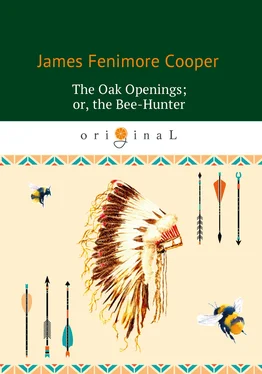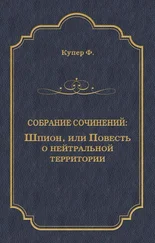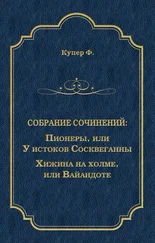Further stay was out of the question; for the Indians were now collected in a body on the brow of the hill, where the chief was rapidly issuing his orders. In a minute the band dispersed, every man bounding into the darkness, as if aware of the danger of remaining within the influence of the bright light thrown from the fire. Then came such a clamor from the dogs, as left no doubt in the mind of the bee-hunter that they had scented and found the remains of the fallen man. A fierce yell came from the same spot, the proof that some of the savages had already discovered the body; and le Bourdon told his companion to follow, taking his way across the marsh as fast as he could overcome the difficulties of the path.
It has already been intimated that it was not easy, if indeed it were possible, to cross that piece of low wet land in a direct line. There was tolerably firm ground on it, but it lay in an irregular form, its presence being generally to be noted by the growth of trees. Le Bourdon had been very careful in taking his landmarks, foreseeing the probability of a hasty retreat, and he had no difficulty for some time in keeping in the right direction. But the dogs soon left the dead body, and came bounding across the marsh, disregarding its difficulties; though their plunges and yells soon made it apparent that even they did not escape altogether with dry feet. As for the savages, they poured down the declivity in a stream, taking the dogs as their guides; and safe ones they might well be accounted, so far as the SCENT was concerned, though they did not happen to be particularly well acquainted with all the difficulties of the path.
At length le Bourdon paused, causing his companion to stop also. In the hurry and confusion of the flight, the former had lost his landmarks, finding himself amidst a copse of small trees, or large bushes, but not in the particular copse he sought. Every effort to get out of this thicket, except by the way he had entered it, proved abortive, and the dogs were barking at no great distance in his rear. It is true that these animals no longer approached: for they were floundering in the mud and water; but their throats answered every purpose to lead the pursuers on, and the low calls that passed from mouth to mouth, let the pursued understand that the Pottawattamies were at their heels, if not absolutely on their trail.
The crisis demanded both discretion and decision; qualities in which the bee-hunter, with his forest training, was not likely to be deficient. He looked out for the path by which he had reached the unfortunate thicket, and having found it, commenced a retreat by the way he had come. Nerve was needed to move almost in a line toward the dogs and their masters; but the nerve was forthcoming, and the two advanced like veterans expecting the fire of some concealed but wellarmed battery. Presently, le Bourdon stopped, and examined the ground on which he stood.
“HERE we must turn, Chippewa,” he said, in a guarded voice. “This is the spot where I must have missed my way.”
“Good place to turn ‘bout,” answered the Indian – “dog too near.”
“We must shoot the dogs if they press us too hard,” returned the bee-hunter, leading off rapidly, now secure in the right direction. “They seem to be in trouble, just at this time; but animals like them will soon find their way across this marsh.”
“Bess shoot Pottawattamie,” coolly returned Pigeonswing. “Pottawattamie got capital scalp – dog’s ears no good for nutting any more.”
“Yonder, I believe, is the tree I am in search of!” exclaimed le Bourdon. “If we can reach that tree, I think all will go well with us.”
The tree was reached, and the bee-hunter proceeded to make sure of his course from that point. Removing from his pouch a small piece of moistened powder that he had prepared ere he liberated the Chippewa, he stuck it on a low branch of the tree he was under, and on the side next the spot where he had stationed Margery. When this was done, he made his companion stand aside, and lighting some spunk with his flint and steel, he fired his powder. Of course, this little preparation burned like the fireworks of a boy, making sufficient light, however, to be seen in a dark night for a mile or more. No sooner was the wetted powder hissing and throwing off its sparks, than the bee-hunter gazed intently into the now seemingly tangible obscurity of the marsh. A bright light appeared and vanished. It was enough; the bee-hunter threw down his own signal and extinguished it with his foot; and, as he wished, the lantern of Margery appeared no more. Assured now of the accuracy of his position, as well as of the course he was to pursue, le Bourdon bade his companion follow, and pressed anew across the marsh. A tree was soon visible, and toward that particular object the fugitives steadily pressed, until it was reached. At the next instant Margery was joined; and the bee-hunter could not refrain from kissing her, in the excess of his pleasure.
“There is a dreadful howling of dogs,” said Margery, feeling no offence at the liberty taken, in a moment like that, “and it seems to me that a whole tribe is following at their heels. For Heaven’s sake, Bourdon, let us hasten to the canoes; brother and sister must think us lost!”
The circumstances pressed, and the bee-hunter took Margery’s arm, passing it through one of his own, with a decided and protecting manner, that caused the girl’s heart to beat with emotions not in the least connected with fear, leaving an impression of pleasure even at that perilous moment. As the distance was not great, the three were soon on the beach and near to the canoes. Here they met Dorothy, alone, and pacing to and fro like a person distressed. She had doubtless heard the clamor, and was aware that the savages were out looking for their party. As Margery met her sister, she saw that something more than common had gone wrong, and in the eagerness of her apprehensions she did not scruple about putting her questions.
“What has become of brother? Where is Gershom?” demanded the sensitive girl, at once.
The answer was given in a low voice, and in that sort of manner with which woman struggles to the last to conceal the delinquencies of him she loves.
“Gershom is not himself, just now,” half whispered the wife – “he has fallen into one of his old ways, ag’in.”
“Old ways?” slowly repeated the sister, dropping her own voice to tones similar to those in which the unpleasant news had just been communicated. “How is that possible, now that all the whiskey is emptied?”
“It seems that Bourdon had a jug of brandy among his stores, and Gershom found it out. I blame no one; for Bourdon, who never abuses the gifts of Providence, had a right to his comforts at least; but it IS a pity that there was anything of the sort in the canoes!”
The bee-hunter was greatly concerned at this unwelcome intelligence, feeling all its importance far more vividly than either of his companions. They regretted as women; but he foresaw the danger, as a man accustomed to exertion in trying scenes. If Whiskey Centre had really fallen into his old ways, so as to render himself an incumbrance, instead of being an assistant at such a moment, the fact was to be deplored, but it could only be remedied by time. Luckily they had the Indian with them, and he could manage one of the canoes, while he himself took charge of the other. As no time was to be lost – the barking of the dogs and the cries of the savages too plainly letting it be known that the enemy was getting through the marsh by some means or other – he hurried the party down to the canoes, entering that of Whiskey Centre at once.
Le Bourdon found Gershom asleep, but with the heavy slumbers of the drunkard. Dolly had removed the jug and concealed it, as soon as the state of her husband enabled her to do so without incurring his violence. Else might the unfortunate man have destroyed himself, by indulging in a liquor so much more palatable than that he was accustomed to use, after so long and compelled an abstinence. The jug was now produced, however, and le Bourdon emptied it in the river, to the great joy of the two females, though not without a sharp remonstrance from the Chippewa. The bee-hunter was steady, and the last drop of the liquor of Gascony was soon mingling with the waters of the Kalamazoo. This done, the bee-hunter desired the women to embark, and called to the Chippewa to do the same. By quitting the spot in the canoes, it was evident the pursuers would be balked, temporarily at least, since they must recross the marsh in order to get into their own boats, without which further pursuit would be fruitless.
Читать дальше












